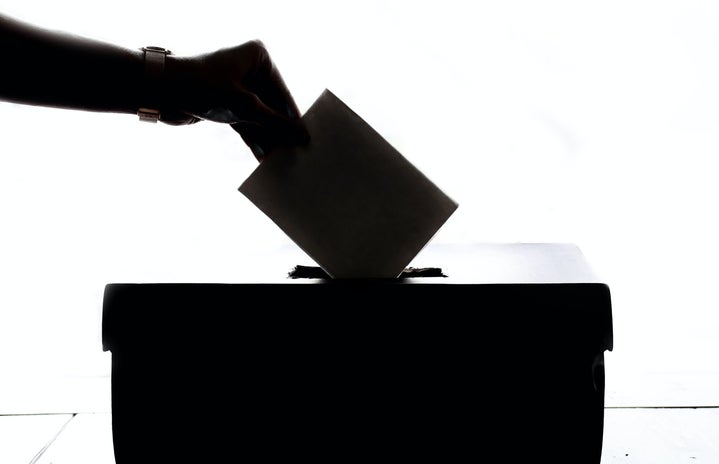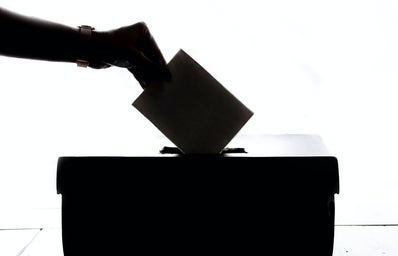It started with the election link.
As a fairly invested member of the Brown community with an affinity for reading signs and emails, I had been loosely following Brown’s student government elections since campaigning began. In a mostly opaque process, hopeful candidates had to obtain enough petition signatures to officially be on the ballot; then, after about a week of promotion around campus, a day of speeches, and the constant resharing of stylizing platform documents on Instagram stories, the election took place. I clicked the link sent in an email from the Student Government Association (SGA), Brown’s newly-formed—and when I say newly, I mean a few months ago—holistic student government entity. As soon as I entered the form, I knew some mistake had been made; one of the candidates listed for president of the Undergraduate Council of Students (UCS) was the current president, who as a senior, surely wasn’t looking to retain her position after she graduated. A few clicks through the form showed none of the candidates were right. I was looking at the election form from spring 2021.
An hour later, SGA redistributed the proper link. But for me, a freshman experiencing Brown student government for the first time, the election’s legitimacy and the governing abilities of SGA were already in question. Mystified, I cast my vote and moved on.
Fast forward to Monday the 18th, when the election results were released—via the Brown Daily Herald. I had been waiting for an email with the results from SGA ever since the ballots closed on Friday, assuming that with an electronic form votes could be tallied instantaneously. But no email arrived, and the Herald’s report didn’t even seem to list the results from every individual election. The candidate declared UCS president, who also happens to be the curator of the @brownumemes Instagram account, won with just 34.5% of the vote, a margin of 24 votes over the second-place candidate. According to the Herald, SGA had “standardized the election procedure” in its first few months, discarding the rule that any candidate had to receive the majority vote; hence, 34.5% would suffice.
Okay. I was still confused why SGA, or its subsidiary Elections Board, which you can read about in the Election Code on UCS’s website, hadn’t published the results officially, but I accepted the Herald’s reporting and once again, moved on.
During my search for that Election Code, by the way, I discovered that UCS still has a handbook summarizing the 2020 elections posted on its election procedure webpage, and the section title Elections on its website once again lists candidates from last year’s election. On another page of the UCS website is a section that started causing a lot of trouble, only a few days after the Herald published election results: a little document called the UCS Constitution, which states the fundamental principles of student governance at Brown. Article VIII, Section 2 reads in crystal clear language: “elections for [UCS] positions shall be by majority vote. In the event that no candidate for a position obtains a majority vote, a run-off election will be held between those two candidates having the largest plurality.”
At the beginning of this semester, in the wake of its new formation, SGA didn’t just announce it was removing the majority requirement from student government elections; in fact, the organization, composed of leaders from UCS, CCB, and UFB, made sweeping changes to the customary elections procedure. Group endorsements were disallowed; only 50 signatures, not 100, were required for candidacy; the election was reduced from a month to one week; and candidate debates were removed.
The issue with those reforms, at least in the eyes of candidate for UCS president Ricky Zhong, is that they are partly unconstitutional. Under the UCS constitution, first ratified in 1976, candidates must win with a majority. Zhong submitted a petition to SGA that the election results were unconstitutional, just 27 hours after Chas Steinbrugge, colloquially “the brownumemes guy,” was declared the winner.
With University President Christina Paxton’s support, SGA quickly announced a runoff election. Steinbrugge responded with a ten-page open letter—read it here—alleging 25 violations in SGA’s oversight of the election and Zhong’s filing of the complaint, based on the aforementioned Election Code, which is readily available on the UCS website. Many of his complaints focus on the absence of the Elections Board, which as stipulated in the published SGA Election Code, should have been formed, but never was. With the presence of so much outdated information in SGA emails and on the UCS website, it might even be true that this Election Code no longer applies; the alternative, that SGA ignored it and ran the elections unilaterally with its brand new power, is also possible. Steinbrugge went on to publish pages of memes on @brownumemes, alleging that UCS was plotting to reverse the rightful election results.
For now, the runoff is still planned for next Tuesday, and voting will only last 28 hours. It is still unclear whether the majority rule applies only to UCS candidates, or to CCB and UFB candidates as well, considering the bylaw is only in the UCS constitution.
Reading and trying to understand the violations, complaints, and oversights in this election is enough to make anyone lose faith in student government. In fact, it’s a common attitude around campus. Only 1,556 votes were cast in this year’s election—out of 6,792 undergraduate students. That’s a dismal turnout of less than 25%. Many voters believe our student government is just a resume bullet point for eager students, incapable of making any visible changes. And while it’s true that SGA can’t immediately alter dining or housing policy, the student government does have two things that should matter for us as a student body: funding, and a voice that represents us. Whatever our complaints, UCS and CCB are using that funding—toward the airport shuttle, toward a program distributing free menstrual products, toward Gala, and more. Moreover, the Undergraduate Finance Board gets to decide which clubs get funding, and how much they get; UFB directly affects every student involved in a student organization. And because we vote to elect them—however small our turnout for the election may be—the members of UCS, CCB, and UFB represent us. They are meant to advocate on behalf of us, the student body.
I used to be one of those skeptics about student government, dismissive of its capability and the self-serving way students ran for office. But witnessing this SGA election at Brown has changed my mind. It was poorly organized, perplexing, and lacked proper communication at all stages. As important as the SGA is in enhancing our experience at Brown, it seems that they aren’t putting enough care and effort into arguably the most crucial part of the club: the student elections. On some level, the student government organizations operate just like any other club at Brown. Scroll through their powerpoint for the 2022 elections, and you’ll see slides of group pictures on trips and outings, trying to convince students to join UCS for its community. But those pictures forget that the ethos behind student government is unlike any other club at Brown. It’s the same ethos behind our democracy: the people get a say. The students have the right to become candidates themselves, to vote for candidates, to have access to free and fair elections. This year’s mismanagement demonstrates that when it comes to elections, SGA’s heart just isn’t in it. And for us, that’s a problem.
So whether you support one candidate or the other in the race for UCS president, or any of the other races, SGA’s blundering should matter to you. It’s often said that college is like ‘practice’ for living life as an adult, and operating under SGA is our practice for living in a democracy. We should demand clear communication, adherence to the constitution, and coherence about policy and procedure. We should demand proper elections.
If you’re frustrated like I am, and not sure what to do, the first thing we can both do is vote in next week’s runoff. We can also attend UCS meetings, which per the UCS Code of Operations should be public and open to all members of the Brown community. We can reach out to class and school-wide representatives to present our ideas and ask questions about what the SGA is doing. We can run for office ourselves. Active participation and demanding accountability can save America’s democracy, and they can save Brown’s student democracy as well. Use your voice and exercise your rights, so we don’t have an election botched like this one ever again.


